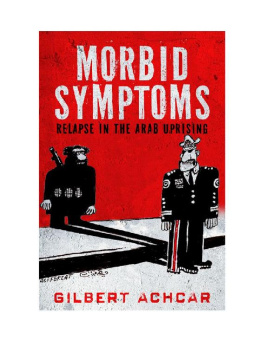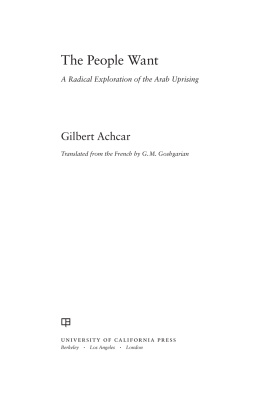Stanford University Press
Stanford, California
2016 by Gilbert Achcar. All rights reserved.
Published by Stanford University Press
No part of this book may be reproduced or transmitted in any form or by any means, electronic or mechanical, including photocopying and recording, or in any information storage or retrieval system without the prior written permission of Stanford University Press.
Printed in the United States of America on acid-free, archival-quality paper
Library of Congress Cataloging-in-Publication Data
Names: Achcar, Gilbert, author.
Title: Morbid symptoms : relapse in the Arab uprising / Gilbert Achcar.
Description: Stanford, California : Stanford University Press, 2016. | Includes bibliographical references and index.
Identifiers: LCCN 2016011912 (print) | LCCN 2016012450 (ebook) | ISBN 9781503600300 (cloth : alk. paper) | ISBN 9781503600317 (pbk. : alk. paper) | ISBN 9781503600478 (eBook)
Subjects: LCSH: Arab Spring, 2010- | Protest movementsArab countries. | SyriaHistoryCivil War, 2011- | EgyptHistoryProtests, 2011- | SyriaPolitics and government2000- | EgyptPolitics and government21st century.
Classification: LCC JQ1850.A91 A335 2016 (print) | LCC JQ1850.A91 (ebook) | DDC 909/.097492708312dc23
LC record available at http://lccn.loc.gov/2016011912
Cover design: Christian Fuenfhausen
Cover cartoon: Ali Ferzat
Morbid Symptoms
Relapse in the Arab Uprising
Gilbert Achcar
Stanford University Press
Stanford, California
Stanford Studies In Middle Eastern and Islamic Societies and Cultures
The crisis consists precisely in the fact that the old is dying and the new cannot be born; in this interregnum a great variety of morbid symptoms appear.
Antonio Gramsci, Prison Notebooks (1930)
With this system Ill make my fortune quickly; then I will kill everybody and leave.
Alfred Jarry, King Ubu (1896)
Contents
Preface
As happens quite often, this book did not start as a full book project. My initial intention was to write an updated chapter for a second edition of The People Want: A Radical Exploration of the Arab Uprising (2013). I therefore embarked on drafting an assessment of the developments that had occurred since I finished writing that previous book in October 2012. In order not to exceed the limits of a chapter, I decided to focus my assessment on the tragic developments in two key countries Syria and Egypt with a brief survey of the other theatres of the 2011 regional uprising.
Unsurprisingly, the chapter soon turned into much more than could be accommodated as an appendix to a book that is already quite thick. I therefore decided to go for a new book, and thus use all the space I needed for a thorough assessment of the most recent events. The People Want will be reprinted as it is: a book dedicated to explaining the economic, social and political roots and causes of the upheaval that engulfed the whole Arab region in 2011, and is not anywhere near ending, as well as examining the determinants and parameters of the revolutionary dynamics that it unleashed, with a balance sheet of its first two years. As such, it can surely be discussed, but it did not become obsolete. Readers will judge whether or not I am right in my contention that none of the diagnoses and prognoses I made in 2012 were contradicted by subsequent events.
This new book is therefore both a sequel to The People Want and a book that stands on its own, written on the assumption that the reader may not have read the former. For this reason, I have briefly summarised for each of the cases that I discuss here what my assessment was in the autumn of 2012, taking the analysis from there or from an earlier stage when needed, in order to make the developments that I am describing fully understandable and assessing the prospects as they seem after five years of upheaval.
I hope that this new book will stand the test of time as the previous one has. But I would be very much happier if ongoing events were to disprove the pessimism of my assessment.
London, 21 December 2015
On Transliteration of Arabic
The transcription of Arabic words and names in the Latin alphabet in this book is a simplified version of the transliteration in use in specialised literature. This is in order to make it easier for non-specialists to read the text, while allowing Arabic-readers to recognise the original. Special characters and diacritical marks have been avoided, except for the inverted apostrophe representing the Arabic letter ayn. The common spellings of the names of the best-known individuals and groups have been retained. Finally, Arab authors and organisations own transliterations of their names in the Latin alphabet have been respected.
Acknowledgements
I am deeply grateful to Ali Ferzat for having graciously authorised me to adorn the cover of this book with one of his drawings. The recipient of many awards, Ali Ferzat has become one of the worlds most famous political cartoonists. Circumventing censorship, his drawings have provided a radical critique of injustice and oppression over decades in Syria, his homeland, and across the Arab world. In 2011, he was assaulted by pro-regime gunmen who beat him up, breaking his hands and fingers.
Special thanks are due to Sarah Cleave at Saqi Books and Kate Wahl at Stanford University Press with whom it was my pleasure to prepare this book. I am also thankful to my good friend Omar El Shafei and the two anonymous reviewers solicited by SUP for their useful remarks on the manuscript.
Introduction
Of Revolutionary Cycles and Seasons
Lo, Winter comes! the grief of many graves, The frost of death, the tempest of the sword, The flood of tyranny, whose sanguine waves Stagnate like ice at Faith, the enchanters word, And bind all human hearts in its repose abhorred.
Percy Bysshe Shelley, The Revolt of Islam (1818)
The designation Arab Spring was most often used sarcastically during the fifth year since the Arab uprising commenced. Such sarcasms had actually started multiplying ever since the regional revolutionary upheaval began turning sour, in the autumn of 2011. They were facilitated by the fact that Arab Spring, in the mind of most of its users at the early stage of the uprising, was not meant to designate one phase in an open-ended sequence of revolutionary seasons, where autumn and winter were to follow spring and summer. It was rather meant as a one-time political mutation; to use a word related to the same metaphor, it was seen as the long-overdue blossoming of democracy in the Arab region. According to this view, Arab-speaking countries were finally, albeit belatedly, joining what Samuel Huntington had identified as the third wave of democratization a chain of political mutations that started in the 1970s.
Democratic Transition and Revolutionary Process
The mood was all the more euphoric in 2011 because the Arab uprising happened at a time when the cautious pessimism of the arch-realist Huntington looked more and more vindicated. Countering the blissful optimism and Western triumphalism encapsulated in Francis Fukuyamas 1989 end of history delusion,
Hence the deep sigh of relief that the Arab Spring occasioned in 2011. The discussion thereafter turned on whether this dramatic sequence of democratic upheavals represented a continuation of the third wave of democratization, or the beginning of a fourth wave, after a short reverse interlude. For not only did the political uprisings that swept across the Arab world over [that] year represent the most significant challenge to authoritarian rule since the collapse of Soviet communism, as Freedom Houses report stated, but they were taking place moreover in a region that had seemed immune to democratic change.
Next page











